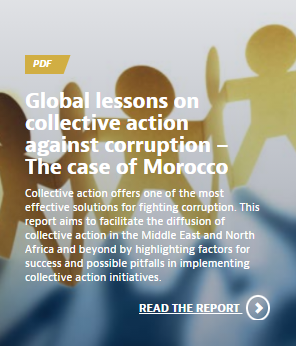Business Integrity
 Business integrity is a world-wide challenge with complex social, political and economic dimensions, and is a major obstacle to sustainable and competitive development. Beyond its extremely negative consequences for democracy and the rule of law, corruption complicates market regulation, hinders private sector-led growth and discourages foreign investment. Estimates show that the cost of corruption reaches beyond 5% of global GDP (US$ 2.6 trillion) and increases the cost of doing business by up to 10% on average (World Economic Forum).
Business integrity is a world-wide challenge with complex social, political and economic dimensions, and is a major obstacle to sustainable and competitive development. Beyond its extremely negative consequences for democracy and the rule of law, corruption complicates market regulation, hinders private sector-led growth and discourages foreign investment. Estimates show that the cost of corruption reaches beyond 5% of global GDP (US$ 2.6 trillion) and increases the cost of doing business by up to 10% on average (World Economic Forum).
The international community has adopted several conventions to fight corruption at the international level, including the OECD Convention on Combating Bribery of Foreign Public Officials. Accordingly, numerous countries have tightened their legislative arsenals in this area, both in terms of repression and prevention obligations on the part of companies. Many domestic laws now oblige companies to set up a system to prevent both active and passive corruption. In addition, private sector companies – as both actors and victims of corruption – are increasingly realising the adverse effects of corruption on their economic health, viability and long-term stability.
In the Middle East and North-Africa (MENA), a number of countries have made the fight against corruption a priority by passing laws and adopting strategies to combat corruption. However, progress in eliminating this problem has been limited and corruption still stands as a major obstacle for doing business in the region.
In this context, fighting corruption is increasingly becoming a business decision, with companies mobilised to implement actions to strengthen business integrity to complement measures taken by public authorities.
Events
- 23 May 2023 | Promoting Integrity and Fighting Corruption in the MENA Region | Draft Agenda
- 30 Jan-2 Feb 2023 | OECD-IMF CEF Training Course: Boosting corruption detection in the MENA region
- 13-15 Dec 2022 | GIZ-OECD Project on Fighting Corruption and Promoting Business Integrity in the Electricity Sector Capacity Building Seminar | Draft Agenda
- 13 Sep 2022 | GIZ-OECD Project on Fighting Corruption and Promoting Business Integrity in the Electricity Sector Kick-off Seminar | Draft Agenda
- 24 May 2022 | Roundtable on collective action against corruption in South Africa | Draft Agenda
- 23 May 2022 | Workshop on promoting international anti corruption standards in academic curricula (South Africa) | Draft Agenda
- 7-10 Feb 2022 | Boosting corruption detection in the MENA region, Regional training course, Kuwait, Agenda
Fair Market Conditions for Competitiveness in Algeria, Saudi Arabia and South Africa

The Fair Market Conditions for Competitiveness Project is supported by the Siemens Initiative for Integrity and aims to support 6 countries, including Algeria, Saudi Arabia and South Africa, embarking on an ambitious Collective Action initiative.
This project aims to support efforts in the areas of anti-corruption and fair competition through the promotion of international standards and the adoption of a multi-stakeholder approach. Activities will focus on the creation of a Collective Action community that involves all relevant actors, including the private sector, academia and civil society representatives. This dialogue platform should facilitate the development of coalitions against corruption to strengthen business integrity in strategic economic sectors particularly exposed to corruption risks. Furthermore, the OECD will provide targeted and actionable policy recommendations to policymakers to enhance the institutional framework and to strengthen capacities of enforcement agencies.
Events
28-29 Jun 2022 | Algeria: Training workshops led by the OECD Anti-Corruption Division | Draft Agenda (FR)
24 May 2022 | South Africa: Roundtable on collective action against corruption Draft Agenda
23 May 2022 | South Africa: Workshop on promoting international anti-corruption standards in academic curricula Draft Agenda
29 Mar 2022 | Algeria: Roundtable on collective action against corruption| Draft Agenda (FR)
24 Jan 2022 | Algeria: Kick off Agenda
Fighting corruption and promoting business integrity in the electricity sector in Iraq
This project, supported by GiZ, aims to assist governmental institutions and representatives from the electricity sector to fight corruption and promote integrity.
The project will assist governmental institutions and representatives from the electricity sector (both companies and business associations) in Iraq in going after corruption and promoting integrity in the electricity sector by:
• Contributing to a more transparent business climate though public and private integrity actions;
• Raising awareness of both government officials and private sector representatives on OECD recognised integrity norms and standards to combat corruption and their related tools ;
• Support capacity building of different government institutions concerning the economic impact of bribery and the implementation of anticorruption measures;
• Identifying corruption risks and anti-corruption needs and priorities in the electricity sector by engaging in extensive consultations with all private and public sector stakeholders (e.g. using surveys and awareness raising events);
• Promoting the development of voluntary compliance tools and collective actions to fight corruption;
Project factsheet | مكافحة الفساد وتعزيز نزاهة الأعمال ي ف قطاع الكهرباء ي ف العراق
MENA-OECD Business Integrity Network (MOBIN)
The MOBIN is a unique regional platform working to promote business integrity in the region. It brings together regional businesses and public anti-corruption officials to build awareness about the need to fight corruption and develop a culture of integrity by:
Organising meetings and seminars where both private- and public-sector representatives can meet with OECD experts and exchange experiences on how to combat bribery and corruption, and foster integrity.
- Inviting key players to participate in important OECD anti-corruption and integrity events like the OECD Global Network of Law Enforcement Practitioners against Transactional Bribery and the annual OECD Anti-Corruption and Integrity Forum.
- Sharing and promoting OECD tools and standards.
- Applying the OECD working methods of evidence-based policy dialogue, peer reviews, and mutual learning, in its activities.
This 2020 report reviews the pioneering experience of collective action in the health, transportation and energy sectors of Morocco. It presents the different stages of implementing such action to promote integrity and analyses the lessons learned. As such, the report provides practical guidance to companies wishing to launch collective action, as well as governments and representatives of civil society, who can facilitate and/or associate themselves with this action.
This work was carried out within the framework of the project “Strengthening business integrity in Morocco”, supported by the Siemens Initiative for Integrity, which assisted Morocco in its determination to strengthen the integrity of companies and create a better environment for foreign investment, international trade and economic development. This project is also part of the long and active collaboration between the OECD and Morocco in the framework of the MENA-OECD Competitiveness Programme and the Morocco Country Programme, with the close co-operation of the Confédération générale des entreprises du Maroc (CGEM). The project also benefitted from the support of the Swedish International Development Cooperation Agency (SIDA).
Regional training courses
Strengthening integrity in the public and private sector
Since 2013, the MENA-OECD Competitiveness Programme and the IMF Middle East Centre for Economics and Finance (CEF) in Kuwait City organise annual week-long capacity-building workshops to share and discuss instruments, methodologies and good practices in support of business integrity.
- Boosting corruption detection in the MENA region, Regional training course, Kuwait, 7-10 Feb 2022
Country Focus: Morocco, Egypt and Yemen
Business Integrity in Egypt
Under the forthcoming Egypt Country Programme, the OECD will support Egypt’s anti-corruption efforts, in line with the country’s National Anti-Corruption Strategy 2019-2022, to develop a robust legal and institutional anti-corruption framework aligned with the highest international standards; increased awareness of the best international standards and practices among anti-corruption officials; and a strong public-private dialogue that enhances the effectiveness of the impact of anti-corruption measures.
Business Integrity in Morocco
Under the current Phase II of the Morocco Country Programme, the OECD is conducting an in-depth analysis of the country legal framework to combat foreign bribery. Under the Phase I of the Country Programme, the OECD had previously conducted an Integrity scan of Morocco (2018).
![]()
Business Integrity in Yemen
In the context of the current EU-OECD Project "Promoting Economic Resilience in Yemen", which aims to strengthen and enable key central level institutions to lead economic recovery and create the conditions for private sector development, the OECD will engage with key anti-corruption stakeholders and conduct capacity-building to develop higher awareness, better skills and capacity to fight corruption and promote business integrity.

Publications
Publication: Global lessons on collective action against corruption - The case of Morocco
This 2020 report reviews the pioneering experience of collective action in the health, transportation and energy sectors of Morocco. It presents the different stages of implementing such action to promote integrity and analyses the lessons learned. As such, the report provides practical guidance to companies wishing to launch collective action, as well as governments and representatives of civil society, who can facilitate and/or associate themselves with this action.
This work was carried out within the framework of the project “Strengthening business integrity in Morocco”, supported by the Siemens Initiative for Integrity, which assisted Morocco in its determination to strengthen the integrity of companies and create a better environment for foreign investment, international trade and economic development. This project is also part of the long and active collaboration between the OECD and Morocco in the framework of the MENA-OECD Competitiveness Programme and the Morocco Country Programme, with the close co-operation of the Confédération générale des entreprises du Maroc (CGEM). The project also benefitted from the support of the Swedish International Development Cooperation Agency (SIDA).
- Morocco: Strengthening Integrity in the Energy,Transportation and Health Sectors,(2018) Also available in French & Arabic
- Diagnostic d'intégrité au Maroc : Mettre en œuvre des politiques d'intégrité pour renforcer la confiance (2018)
- Practices to Strengthen Business Integrity in the MENA Region (2012) Also available in Arabic
- Compétitivité et développement du secteur privé: Maroc 2010, Chapter on Anti-Corruption
- Egypt Business Climate Development Strategy, Chapter on Anti-Corruption (2009)
Related activities
MENA-OECD Business Advisory Board (BAB)
The MENA-OECD Business Advisory Board (BAB) aims to provide a structured, sustainable and well-informed platform for private sector mobilisation. Building such institutional frameworks in which the private sector can participate and effectively contribute to the decision-making process is essential for producing better policy outcomes.
Previous Events
- Annual meeting of the MENA-OECD Business Integrity Network (MOBIN), 15 December 2020
- Boosting the detection and reporting of corruption in the MENA region: what is at stake?, 6-9 January 2020, Kuwait
- Building integrity in MENA through public-private dialogue: State of play and moving forward, 18-19 March 2019, Paris
- Public and Private Sector Alliances in the Fight Against Corruption in GCC and MENA Countries, 7-10 January 2019, Kuwait
- Strengthening Business Integrity in Morocco: International Standards and Collective Actions, 6 December 2018, Rabat
- Progress in fighting corruption and bolstering integrity in Morocco, OECD Days, 11 July 2018, Rabat
- Institutionalising Public-Private Dialogue to Fight against Corruption in the MENA Region, 29 March 2018, Paris
- Strengthening integrity in business - Better detect and fight corruption, Training Course, 8-11 January 2018, Kuwait
- Investigating and Prosecuting Corruption in the MENA Region, Training Course, 3-5 January 2017, Kuwait
- Business Associations and the Fight against Corruption in the Middle East and North Africa, 29 March 2017, Paris
- Enhancing Integrity for Business Development in the Middle East and North Africa,18 April 2016, Paris
- Strengthening Integrity in the Public and Private Sectors in the MENA Region: Reforming and enforcing anti-corruption legislation, Training Course, 23-26 November 2015, Kuwait
- OECD Integrity Week 2014,17-21 March 2014, Paris
- Strengthening Integrity in the Public and Private Sector in the MENA Region: Reforming and enforcing anti-corruption legislation, Training Course, 7-10 April 2014, Kuwait
Contact us
For further information contact: Diane.Pallez-Guillevic@oecd.org



